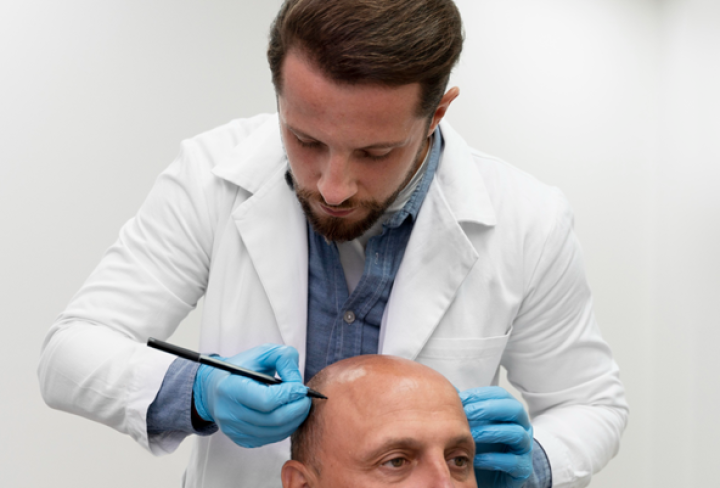Hair transplantation is a procedure that removes hair follicles from one part of the body to a bald or balding part of the body.
Losing hair can have a deep psychological impact as it is related to our appearance. A hair transplant aims to restore a youthful appearance for those distressed due to hair loss (alopecia).
It also helps strengthen a weak hairline and fix missing facial hair on the mustache, beard, eyebrow, or eyelashes.
Though there are many treatments to restore hair, hair transplantation is the most common one.
Types of Hair Transplantation
Fue Hair Transplant (FHU): Removing healthy hair follicles from the scalp and grafting them to the bald or thin areas.
Follicular unit transplantation (FUT): Removes a linear strip of hair from the back of your head and then splits it into individual sections to fill the bald areas.
Possible Side Effects of Hair Transplantation
It is common to expect few side effects after a hair transplant, like,
- Itching and Tightness
- Temporary scabbing
- Tiny Scars
- Swelling
Aftercare Tips for Hair Transplant Surgery
Most people can return to work about 3 days after having a hair transplant.
- Do not wash your hair for a few days following surgery, and use mild shampoos for the first few weeks
- Do not press a brush or comb the new grafts for three weeks
- Do not wear hats or pullover shirts and jackets
- Avoid vigorous physical activity for one week after surgery
- Do not consume alcohol right after the procedure, as it complicates the healing process
Regular follow-ups are very important to track your hair growth.
Benefits of Undergoing Hair Transplantation
- Enhances looks and personality
- The appearance and texture of the hair match perfectly with the existing hair
- There will be no visible scar left on the scalp, and you will not feel any pain during the procedure
- You can return to your daily activities immediately after a few days of bed rest
- This is a one-time procedure and economical
Hair transplantation is permanent and will last for your entire life.
When to Call the Doctor After Hair Transplantation?
Contact your doctor right away if you experience any of the following problems:
- Long lasting Fever
- Excessive Bleeding
- Severe Redness or Pain
- Signs of Infection (green or yellow pus)
Your doctor will schedule follow-up visits to monitor whether the scalp is healing well.
Are You the Right candidate for Hair Transplantation?
You can undergo hair replantation if you:
- Are in good health
- Within the ideal age group (25-65 years)
- Have Permanent Baldness (Runs in Families)
- Still have areas of thick hair growth on your scalp
Hair transplantation is suitable for people with permanent baldness, the type that runs in families.
Is Hair Transplantation a Painful Procedure?
No! You may feel a little pressure or movement sensations during the procedure, which is not painful.
Hair transplantation helps you to achieve your desired appearance
Diet After Hair Transplantation
Good Foods for Your Hair Regrowth:
- Walnuts
- Eggs
- Fish
- Spinach
Taking good care of natural hair after hair transplantation is essential
What Is the Success Rate for Hair Transplantation?
The success rate for hair transplantation is almost 95%. Hair transplantation is a low-risk procedure compared to other surgeries.


